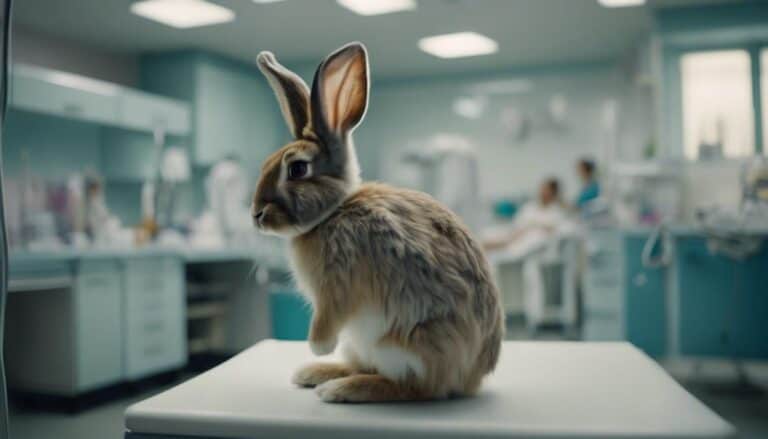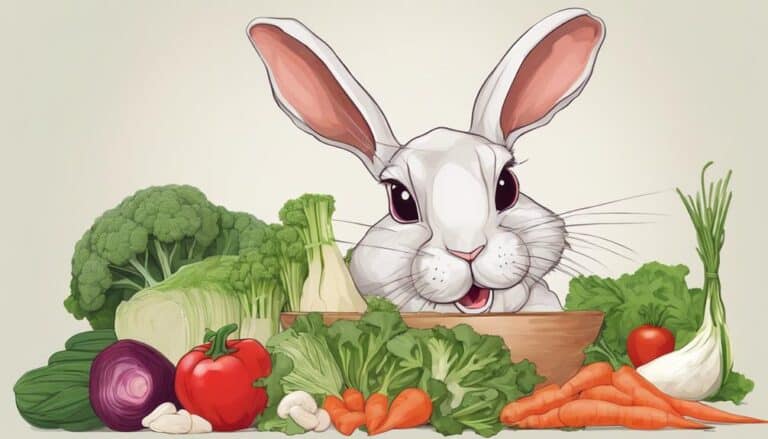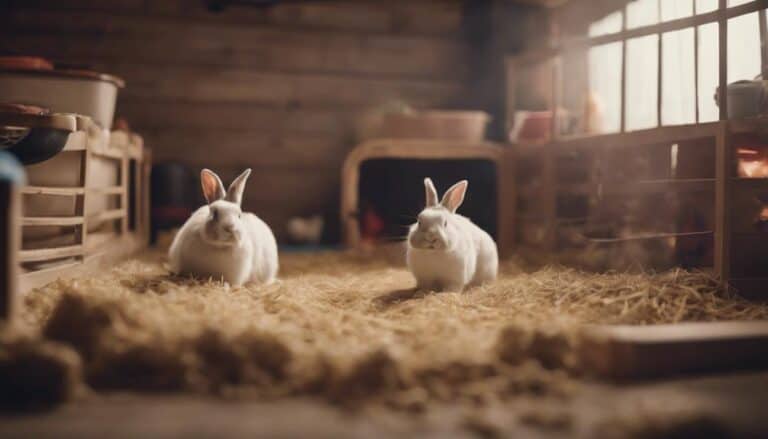Imagine zucchini as a verdant gateway to exploring new dietary options for your furry companion. But, can bunnies really nibble on this green wonder?
Before you take that leap, there are important factors to ponder regarding zucchini's impact on your bunny's well-being. Understanding the nuances of introducing zucchini into your bunny's diet could mean the difference between a happy hopper and a disgruntled nibbler.
So, let's peel back the layers and uncover the truth about bunnies and zucchini.
Contents
- 1 Key Takeaways
- 2 Zucchini: A Safe Treat for Bunnies?
- 3 Nutritional Benefits of Zucchini for Bunnies
- 4 Precautions When Feeding Bunnies Zucchini
- 5 How to Safely Introduce Zucchini to Bunnies
- 6 Monitoring Bunny's Zucchini Consumption
- 7 Frequently Asked Questions
- 8 How Can I Incorporate Zucchini into My Bunny’s Diet If It Prefers Carrots?
- 9 Conclusion
Key Takeaways
- Zucchini is a safe and nutritious treat for bunnies.
- Rich in essential vitamins, minerals, and fiber for digestive health.
- Helps prevent gastrointestinal issues and provides hydration.
- Careful introduction and monitoring are essential for bunny's well-being.
Zucchini: A Safe Treat for Bunnies?
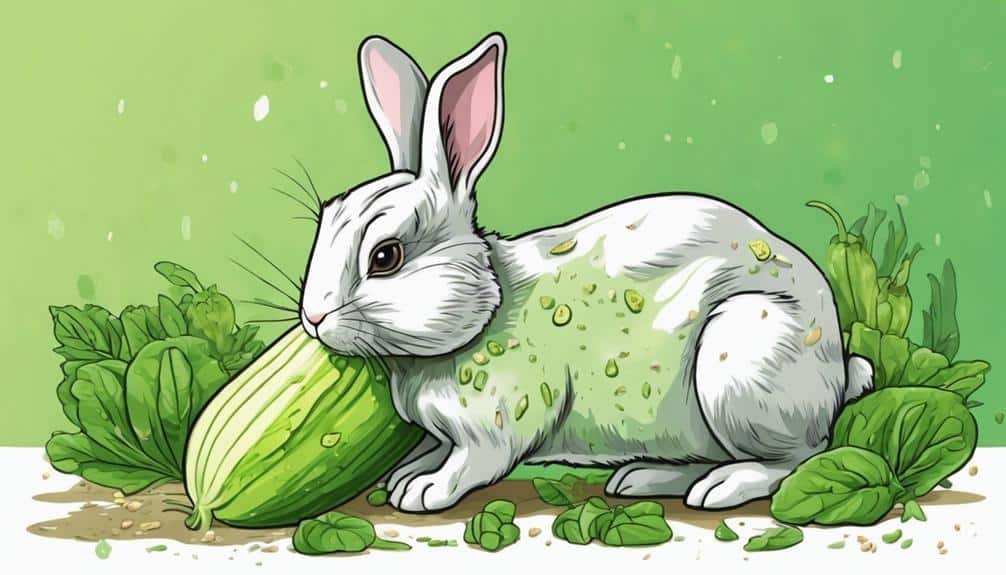
Zucchini can be a safe and nutritious treat for bunnies due to its rich content of essential vitamins and minerals. Rabbits can enjoy zucchini skin, flesh, and seeds, which provide fiber important for their digestive health. The high water content in zucchini also aids in keeping bunnies hydrated, contributing to their overall well-being.
When introducing zucchini into a rabbit's diet, it's essential to do so gradually, observing for any potential adverse reactions. This approach allows you to monitor how well your bunny tolerates this new vegetable. Whether served raw or cooked, zucchini offers a versatile addition to your bunny's diet, providing them with variety and necessary nutrients.
Nutritional Benefits of Zucchini for Bunnies
Rich in essential nutrients important for a bunny's health, zucchini offers a variety of nutritional benefits that can positively impact their overall well-being.
When bunnies eat zucchini, they benefit from:
- High Water Content: Zucchini's high water content helps keep bunnies hydrated, especially vital during hot weather when dehydration risks are higher.
- Dietary Fiber: The dietary fiber in zucchini aids in digestion, promoting a healthy gut and preventing gastrointestinal issues in bunnies.
- Vitamin C: Zucchini is a good source of vitamin C, which supports the immune system of bunnies, helping them stay healthy and ward off illnesses.
Precautions When Feeding Bunnies Zucchini
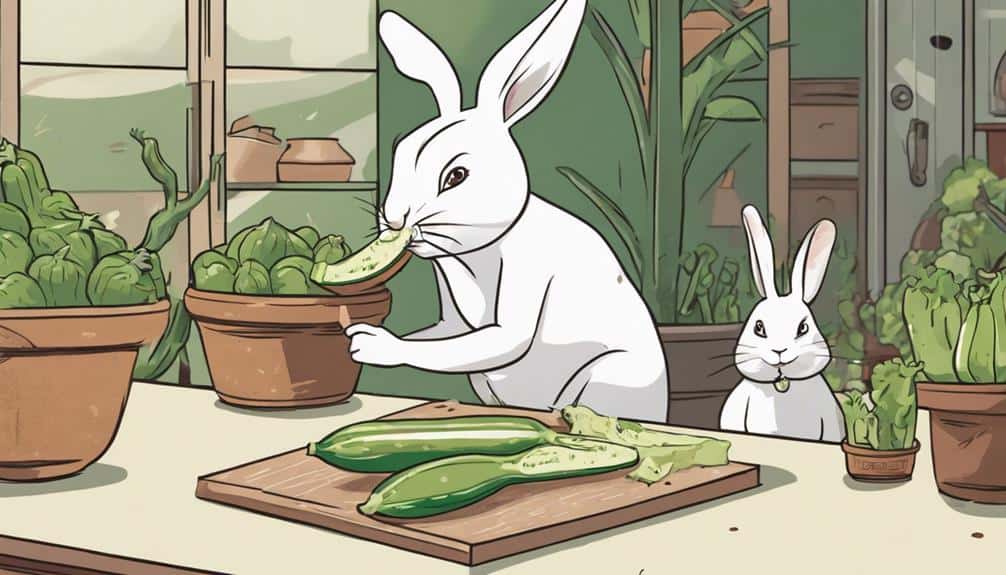
When introducing zucchini into your bunny's diet, it is important to take specific precautions to guarantee their safety and well-being. Rabbits eat zucchini and other vegetables as part of a balanced diet, but their sensitive digestive system requires careful handling. Here are some essential precautions to keep in mind:
| Precautions | Details | Importance |
|---|---|---|
| Wash Thoroughly | Remove pesticides and chemicals by washing zucchini before feeding it to your bunny. | Secures Bunny's Safety |
| Remove the Seeds | Always deseed zucchinis before offering them to rabbits to prevent any digestive issues. | Prevents Complications |
| Introduce Slowly | Start with small amounts and monitor for any adverse reactions, especially in adult bunnies. | Prevents Digestive Issues |
How to Safely Introduce Zucchini to Bunnies
When incorporating zucchini into your bunny's diet, it's important to follow specific steps to guarantee their safe and successful introduction to this vegetable.
- Start Slow: Begin by offering small amounts of raw zucchini to your rabbits gradually. This allows you to monitor their reaction and confirm they can tolerate it well.
- Age Matters: Introduce zucchini to your rabbits around 7 months of age. This timing helps their digestive tract adjust and reduces the likelihood of digestive issues.
- Monitor Closely: Watch your bunny for any signs of digestive problems like diarrhea, constipation, or gas when offering zucchini. If any issues arise, discontinue feeding zucchini and explore other safe treats for your furry friend.
Monitoring Bunny's Zucchini Consumption
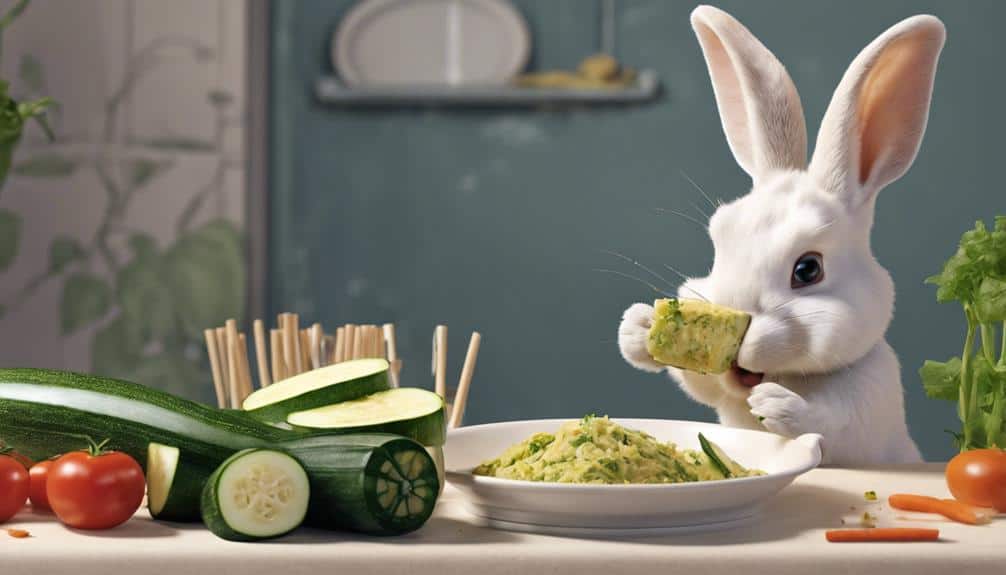
Monitoring your bunny's zucchini consumption involves observing for any signs of digestive issues or discomfort after introducing this vegetable into their diet. Keep an eye out for changes in stool consistency, decreased appetite, lethargy, bloating, or any other unusual behaviors following the introduction of zucchini.
While zucchini can offer health benefits like being low in calories and high in fiber, it's essential to monitor your pet rabbits for any adverse reactions. Remember to feed zucchini leaves sparingly due to their high levels of calcium and oxalic acid, which can lead to dental problems if consumed in large amounts.
If your bunny enjoys zucchini as a new treat, make sure it's fed raw and consider it as a supplement to their primary diet of Timothy hay. If you notice any symptoms of distress or intolerance, consult a veterinarian promptly to address any concerns and maintain your bunny's well-being.
Regular monitoring is key to ensuring that your bunny enjoys zucchini safely without risking potential health issues like heart disease.
Frequently Asked Questions
Are Zucchini Good for Rabbits?
Zucchini benefits rabbits by providing essential nutrients for their diet. This vegetable supports bunny health with its high fiber content, aiding digestion. Offering zucchini as a snack adds variety to their diet and promotes pet nutrition.
What Vegetables Can Rabbits Not Eat?
Avoid feeding your rabbits carrots, spinach, celery, onions, tomatoes, garlic, potatoes, broccoli, cucumbers, and peppers. These vegetables can be harmful or toxic to your furry friends. Stick to safe options like leafy greens, herbs, and select veggies.
Can Rabbits Eat Green Squash?
Yes, rabbits can eat green squash. It provides nutritional benefits, aids in hydration, and is safe for consumption. Remember to remove seeds, introduce slowly, monitor for digestive issues, and seek expert advice for dietary balance and portion control.
Why Can't Rabbits Eat Cooked Vegetables?
When cooking vegetables for rabbits, essential nutrients and enzymes are lost, impacting their digestion. High heat breaks down fiber vital for gut health. Raw veggies hydrate naturally. Cooked ones may contain harmful additives. Rabbits thrive on raw foods.
How Can I Incorporate Zucchini into My Bunny’s Diet If It Prefers Carrots?
If your bunnies and carrots preference is stronger than their willingness to try new foods, you can incorporate zucchini into their diet by slowly introducing it alongside their favorite carrots. Start by mixing small pieces of zucchini with their usual carrots and gradually increase the zucchini portion over time.
Conclusion
To guarantee, zucchini can be a revitalizing and hydrating treat for bunnies, adding a healthy variety to their diet.
Like a crisp, green beacon of nutrition, zucchini offers essential vitamins and minerals to support your bunny's well-being.
By introducing this vegetable gradually and monitoring their consumption, you can safeguard your bunny enjoys the benefits of this safe and delicious snack.
Remember, always prioritize your bunny's health and consult with a veterinarian for any concerns.


